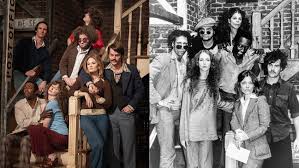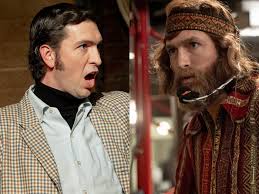I have posted content about SNL on my blog over the last few years ranging from discussing my 20 Favorite Sketches (I need to re-edit that post, but feel free to look regardless!) to talking about the troubled history of original cast member Garrett Morris (which will come into play in this review), and my episode-by-episode reviews of the infamous 6th season which is still a work-in-progress.
Needless to say, I do have an interest in SNL but I find my love of it to also be highly tumultuous. This isn't exactly an uncommon opinion from those who have been avid watchers of the long running variety series which, as of this writing, is currently in the midst of its 50th season.
In my childhood, I really enjoyed watching the old "Best Of" specials ranging from cast members like Eddie Murphy and Gilda Radner or sketch-based specials like SNL Goes Commercial. I began watching SNL first run in the mid-to-late 90s with the cast that included Will Ferrell and Molly Shannon. Since then, I have seen the show truly have some high peaks and low valleys in terms of quality. In fact, around my early years of high school, I sat through two of the worst seasons of the show's history: 29 and 30...and these were so bad that I actually stopped watching consistently ever since, even when the show did have an uptick in quality (which it did shortly thereafter).
We all have our attachments to certain eras. I still think the best combo of stellar writing and cast members comes from the late 80s/early 90s era that included the likes of Dana Carvey, Phil Hartman, and Jan Hooks.
However, we can't ignore where it all began. The first era of SNL, which aired from 1975-1980 is legendary and truly iconic. While some of these episodes have a roughness to them that feels rather erratic at times, you can't help but marvel at them. This was a new property and considering the limitations that the show's imitable creator Lorne Michaels had to work with, he often turned dross into gold.
So when I heard that a film was being made about the early days of SNL, I was truly thrilled. I actually would love to see more content like this about the history of SNL, but it should be made clear: I am actually not as enamored with the final product as I would've liked to be.
Saturday Night is a film that manages to have some truly great qualities, but its concept and approach both strengthen and weaken the results by the time the credits roll.
How accurate WAS Saturday Night? Honestly, a lot of the stuff that happened in the film did occur, but was either heightened for the moment or didn't happen on the night that was being depicted. This is, however, not the reason I am going to criticize the film because that kind of plotting happens all the time in films about true stories/events.
Saturday Night takes place on the night of the series premiere: October 11th, 1975...and despite the fact the show is going live in less than 2 hours, Lorne Michaels (Gabriel LaBelle from The Fabelmans) is trying his best to make sure his show will get on the air smoothly...but he is battling a network, NBC, who gave him a studio with equipment that is 20 years outdated and falling apart and a group of actors and writers whose insecurities or egos or both are adding to the chaos backstage.
These days, I would argue SNL is the definition of a well-oiled machine...perhaps even too much so. I mentioned how the show in those early years would have a rough quality and a lot of that was due to Lorne Michaels trying to find the formula that would make for a successful variety show. I would argue that he found it in various forms of confidence throughout the first 3 seasons, but from the start, he wasn't sure exactly what the show would be. That uncertainty would prove to be a major hurdle for Michaels, whose smoke and mirrors act of trying to steer away the head honchos of the network nearly costs him going live on air at 11:30.
The fast-paced nature of the film is what makes the film highly entertaining and watchable...but the unfortunate thing about this is that it lacks intimacy. I am not saying every film has to be a super long epic that will drain every drop of tears from your eyes, but it is hard to stay invested in the well being of these people.
In fact, I actually began to wonder how well this film would play to those who aren't familiar with the show's history. Knowing who, say, Dick Ebersol is (played here by Cooper Hoffman) certainly worked in my favor but I do have to wonder if this film could've played as even more slight to most other people without having knowledge of the deeper history of the show.
The fact the film is so quickly paced doesn't allow us a chance to grow to care much about the characters, except for Lorne Michaels to an extent...and I think a lot of that is due to how LaBelle's natural boyish "aw shucks" demeanor translates onscreen.
Although, there is one actor I want to single out in particular and that is Lamorne Morris, who most people would recognize as Winston from New Girl and his recent Emmy winning turn as Trooper Whit Farr on season 5 of Fargo.
Here, he plays the fascinating man that is Garrett Morris, the show's first cast member of color and someone who was a bit of an outsider within the show.
*Sidenote: Lamorne Morris has said in interviews that as a kid, he would claim that Garrett Morris was his actual father, a story he has since been able to tell Garrett, who is currently 87 years old as of this writing. Just wanted to add that as I find it utterly adorable.*
When watching Morris play his "father", I was actually very impressed with the absolute care he took to capturing his presence.
G. Morris came from a theatre background having worked with the likes of Harry Belafonte, got training at Julliard, became a published playwright, performed opera throughout the world, and was a key member of the Black Arts Repertory Theater in Harlem.
Michaels had read a play of Morris' that he quite liked and hired him as a writer, despite the fact he had never written in short-form before. Some of the work he turned in, including a superhero sketch entitled "Colored Man" was received with apathy by the show's mercurial headwriter Michael O'Donoghue (who is played perfectly in the film by Tommy Dewey), but considering he had experience as an actor, Michaels decided to hire him as a cast member in hopes to bring people of color onto the roster of the show.
Morris has a swagger about him, but the world of SNL clearly brought him a level of insecurity that nearly destroyed him. If you read my post about him, you will learn more but the movie does flirt with the fact that Morris would turn to drugs to cope with the fact that he just didn't seem to mesh with the world of the show as it was developing. Although - the movie does show us he would have the chops as he does get to sing one of the more famous bits that would happen later on in the first season: singing his "Kill All The Whiteys I See" number.
All of the ensemble truly did a wonderful job at capturing what these people were/are, but Morris did Morris proud here. I sort of wish maybe he had gotten a little more screentime, because I think this performance would be worthy of an Oscar nomination if it had more meat on the bone.
It was also rather fun to see Nicholas Braun, fresh off his stint as Cousin Greg on Succession, playing both Andy Kaufmann and Jim Henson...or see Matthew Rhys disappear into the brilliant facade of George Carlin.
So yes, this isn't exactly a deep review, but I am not sure the film requires one. I found it to be highly enjoyable, but it was also a glossy and semi-cartoonish attempt at capturing a true legendary moment in time. The biggest problem is it just makes you wish there was a way they could dig deeper.
SATURDAY NIGHT
RATING: 6.5/10










